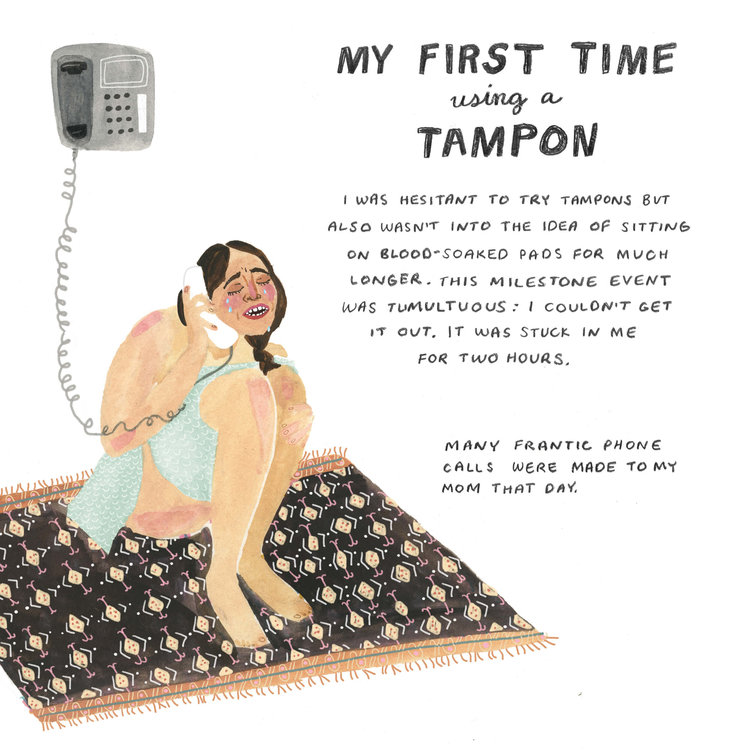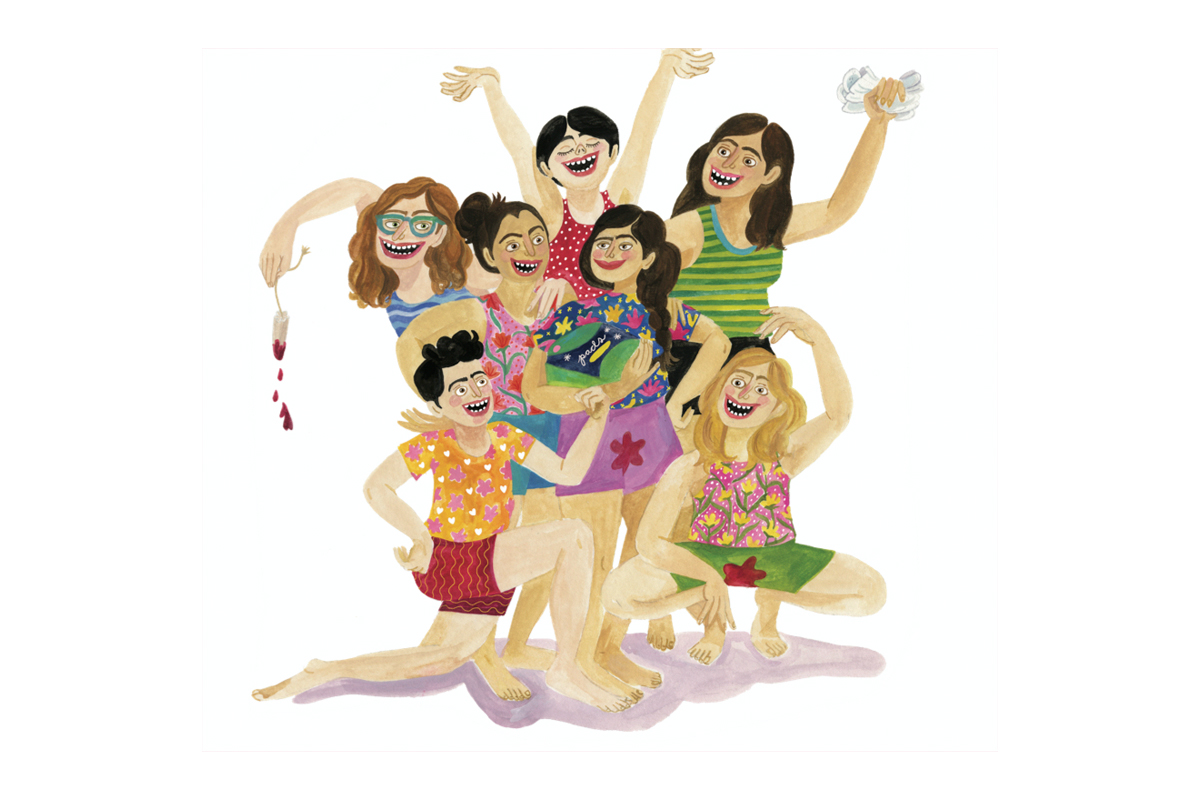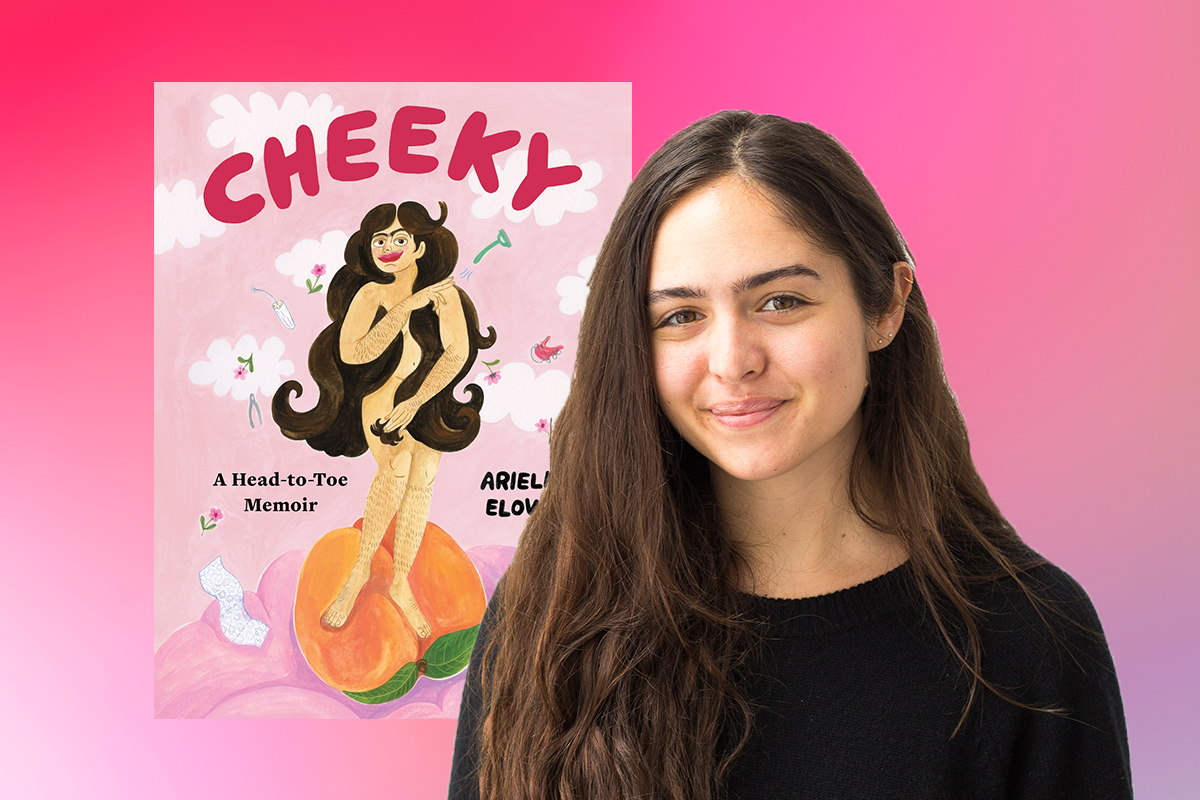Ariella Elovic never thought her debut illustrated memoir would come out during a pandemic. (I mean, how could she have predicted 2020?!) But, in some respects, she is happy Cheeky: A Head-to-Toe Memoir is making its debut at this particular moment in time.
“I would give anything for a little hairy girl to come up to me and be like, ‘Look, we match.’ That’s all I want. I wish that I could meet people in person,” Elovic, a Jewish illustrator, tells me over the phone from her home in Brooklyn. “But I think it’s actually a really nice companion for now. We’re with our bodies all day long, in a way that we’ve never had to be before. If we’re not essential workers, and don’t have jobs that we need to go into work every day, we just are sitting. It’s very easy to slip back into patterns that we don’t like, when we’re just with our bodies all day, so I hope that this is a nice, comforting reassurance that you are enough — not just enough, your body is incredible and it’s going to help you through this.”
Elovic’s Cheeky is a powerful look at bodies — particularly, Jewish hairy female bodies — and how we feel about them. We chatted about hair, insecurities, and the camp friends that give you permission to be gross.
This interview has been lightly edited and condensed for clarity.
What was it like adapting your blog/Instagram account into a full-length memoir?
It definitely wasn’t easy, but it poured out of me. It was something that felt very natural as part of my exploration of accepting the parts of my body I grew up trying to hide, or the things I didn’t like about myself. It felt very natural to kind of go back to the origin point and think more about where did these insecurities come from? What was most interesting for me was that I remembered myself as a young girl being very feisty, very bossy, and very opinionated. I was curious to explore where that went, and why it went away. Especially because I grew up in a home where I have a very strong mother figure in my life — she’s a dentist and owns her own practice. I had that role model in my life; she made a point not to talk about our bodies at home in a way that felt judgmental, good or bad. I would never hear from my mom, “Oh, you look beautiful.” That just wasn’t something that she wanted to call attention to. I was just kind of curious where all this came from, and obviously, it’s very clear it’s a pervasive cultural thing from TV, from movies, etc.
A lot of Cheeky is about your journey to feeling at ease in your own body and with your hair. You were just talking about being an opinionated and feisty young girl — when did you first realize you were so self-conscious of your body?
It’s funny because I have very clear memories of this one time in fourth grade where I heard this popular girl in my class talking — I don’t know how it came up, but she mentioned what size pants she was. And so I went and relabeled my pants with the size. I eventually started learning [that] no, you just can’t just say you’re a size smaller, you have to be a size smaller.
But I think a lot of it was honestly being around boys, for some reason. A lot of my pressure came from just feeling watched. [Sleepaway] camp was both a sanctuary, and probably the birth of a lot of these things. Because being in a bathing suit at swim period with all the boys, and hearing how they felt like they could speak about women’s bodies, really struck me and I think started all of that. But on the flip side, we had shower time at camp where it was the first time I’ve been with so many naked girls in my life. And I saw so many different shapes of boobs, of stomachs, of legs, of everything. And so within the women at camp, I found a sanctuary.
You know, when you wrote about shaving your legs with another friend, it was so funny. I also went to sleepaway camp, and I had forgotten that that was the thing we did — we would sit outside and shave our legs together. It was such a total acceptance of yeah, these are our bodies, but also why would were we shaving our legs, especially when we went to an all girls camp!?
Totally. It’s this balance of ritual around changing ourselves, and then also as a group, I don’t know exactly when we were all like, Why the fuck are we doing this? And it definitely didn’t happen until after camp. Camp kept us holding onto these things. And [my camp friends], the Yentas, I’m still friends with them. We all are in different stages of shaving or not shaving; it’s a personal choice. I think having that base group that’s just accepting and loving enabled us to have the confidence to choose what we actually wanted, or think about what we actually want for ourselves.
I want to get back to the Yentas in a little, because I loved their appearance in Cheeky, but I just want to keep talking about hair for a bit because so many of your illustrations really embrace female body hair, which feels revolutionary, but should not be in the slightest! How did you get to that point of self-acceptance of your hair? Do you have advice for Jewish women who struggle with their hairiness?
For me, it honestly became a pain in the ass to bleach my arms. So I was like, I cannot keep doing this. And for what!? No one’s noticing it! Over time I just stopped caring. With the armpit hair thing, which is very new for me, a lot of it [initially] was being like, woohoo!!! and faking it.
I remember I was home one summer when I started [not shaving my armpits]. My mom was like, “So have you thought about, like, trimming it even?” I would reply, “Why? Why do you think I need to?”
Honestly, we just need to see more of it. I was watching High Fidelity, the remake with Zoë Kravitz, and there was this part where she’s depressed and has just been broken up with. And she’s in her apartment, she props her leg up on her coffee table, and it’s smooth! I texted my friends being like, this is insane! A woman in the middle of the winter who’s effortlessly cool like her, she’s just not shaving her legs. There’s just no way!
Why are we still waxing? Just let her have hair! And it was not her fault. I wonder, in TV and movies, if that’s a question even. Or if they have to [shave].
Getting into yoga weirdly helped me. It was this hot yoga class, you can’t really have a lot of clothes on, and you’re just in this room with a mirror looking at your body the whole time. I forced myself — not in a bad way! — but I [thought], let’s see if I can have fully hairy legs, fully hairy armpits, look at myself for an hour and a half, and see how I feel. I thought I would be in a sea of hairy women in the middle of Brooklyn doing this but I was one of two. I still don’t always do the hairy leg with shorts thing — because I have a ton of hair, you can see it. It’s not like I have wispy, blonde hair. And I’m still trying to get more comfortable with it. But I do think in this case, it’s just that seeing it more would help.
As you were speaking, I was trying to think if I could think of any movies or TV shows or anything where I’ve seen a woman with hairy armpits, or hairy legs, or even hairy arms, and I’m really stuck. I cannot think of any!
Yeah, I can’t. And that’s the problem. Looking around, if I start to pay attention, when I was insecure about it, it was so much about I’m so different from everyone else, like why do I look like this? But if I just stopped to look around, I’m sure I had tons of teachers in my Jewish day school who had hairy arms. All I would have needed was an eighth grader to come up to me to [say], We both have hairy arms. Isn’t that cool? And that would’ve been it. My mom, it’s not her fault, but she’s blonde and hairless essentially. So I didn’t have a female role model who was also hairy to be like ‘it’s okay.’
It’s important for us all to be talking — and not just women, but anyone — about our bodies and how they’re human! We’re not going to all look like each other, and it’s good that we don’t look like each other.
I feel like you’re really creating a space for that on Instagram, as well. Your comics about poops are my absolute favorite. You talk about how our bodies function in a way that I’m really unused to seeing from anywhere, at all. Have you gotten feedback from readers and followers?
I’ve had a few hairy girls reach out about their mustaches and things like that. So that’s been awesome. And the nipple hair thing was huge, that was scary for me to post when I did that at first.
I did a post about getting a tampon stuck when I was younger.

What’s been really great, and I think is my favorite, is when I’ve gotten emails from moms saying that they read the blog post and it really helped them. So that’s a really special conversation for mothers to be having with their daughters, not to exclude fathers from the mix, or sons. That’s a helpful communication to keep open.
Did you read that American Girl doll book?
Yes, The Care and Keeping of You?
Yes. That’s the only book I remember seeing anything about pubic hair, or what my body’s going to look like.
Yes, exactly!
And I feel like Cheeky‘s going to join that tradition, a book that parents can give to their kids as like, these are bodies, and this is how they work.
I really hope so!
Is there a section of the book that’s your favorite? Or the most enjoyable to work on?
The boobs chapter was the most fun just because they’re just funny! The accidental flashing [scene] was part of the initial book proposal, and that still is one of my favorite ones, just because it shows a nice narrative arc and it’s fun. And the food one, because I just love talking about food and drawing food. So the tummy and the boobs are my favorites.
I want to go back to the Yentas, because I just loved when they popped up in the memoir. What do the Yentas mean to you? How did you reconnect with them after camp?
There were a few that I kept in touch with here and there. Then there was an alumni weekend that we all went to. [That weekend] my friend was bringing her Miralax to the bathroom to take some. And I was dealing with intense constipation in college. I didn’t really have anyone who understood. And I was there with my Metamucil. And so we reconnected on the ways we were feeling shitty, and how to feel better.
I just lost touch with them because of not having that same place to go back to each summer. So being with them again was like, wow, this is what it feels like to have people who get you and who you don’t need to explain things to. The Yentas, as a group, gave me space to accept being gross and accept being me. Because it was part of the group if you were gross, it was part of the group if you had an embarrassing fart story, or you leaked somewhere and bled all over something. In the other situations I found myself in, like being new in college, I felt very uptight about keeping all those things inside. At camp, you’re with these people 24 hours a day, so things are going to come up.

I’m excited for them to read it.
[Meet the Yentas here in an exclusive Alma excerpt.]
Has your family read Cheeky yet? What do they think?
My mom loves it. The shoulders chapter made her cry; she really loved it. We’ve had really interesting conversations about it, because she said, “Did I do this to you? I feel bad that I couldn’t be a stronger force against all this stuff.” When I had all these insecurities about my weight, or all these insecurities about my hair, my mom wanted me to feel better, so she helped me find solutions. She helped me find the bleach, she helped me figure out what I needed to eat to feel better. And she was very supportive in that way. But I think, and I’m very interested to see if our generation and the way that we parent, just because of the way we’re talking about things, will be more about: Well, why do you feel insecure? and asking these questions instead of giving solutions right away. Because the solutions aren’t solutions. They just feed into the insecurity, because it keeps making you feel the need to change.
What does being Jewish mean to you in 2020?
It’s comfort to me. It’s obviously a very sensitive time and tumultuous time. And there’s some not wonderful sentiments flying around with white supremacy in the White House, etc. My grandparents, or my mom, will make comments like, Are we safe? It’s sometimes a struggle to figure out — obviously we have privilege, but we’re also a minority. It’s this social responsibility to be supportive and be an active ally. It’s a tough thing to answer: It’s comfort, but it’s also a reminder that you’re part of a community.
What do you hope readers take away from Cheeky?
I hope it’s: Yeah, this is my body. And I know that that’s such a simple notion. I can only speak for myself and what I feel like women feel — I mean, I’m sure men and nonbinary folks feel it too, I don’t mean to make it exclusive for women. We just grow up inundated constantly with [messages about] looking a certain way for someone else and never pausing to say, “No, I’m good.” What I hope the most is that people come away from the book inspired or encouraged to either continue or start work to center back in. This is your home, you get to decide what you do with it and what you don’t.



